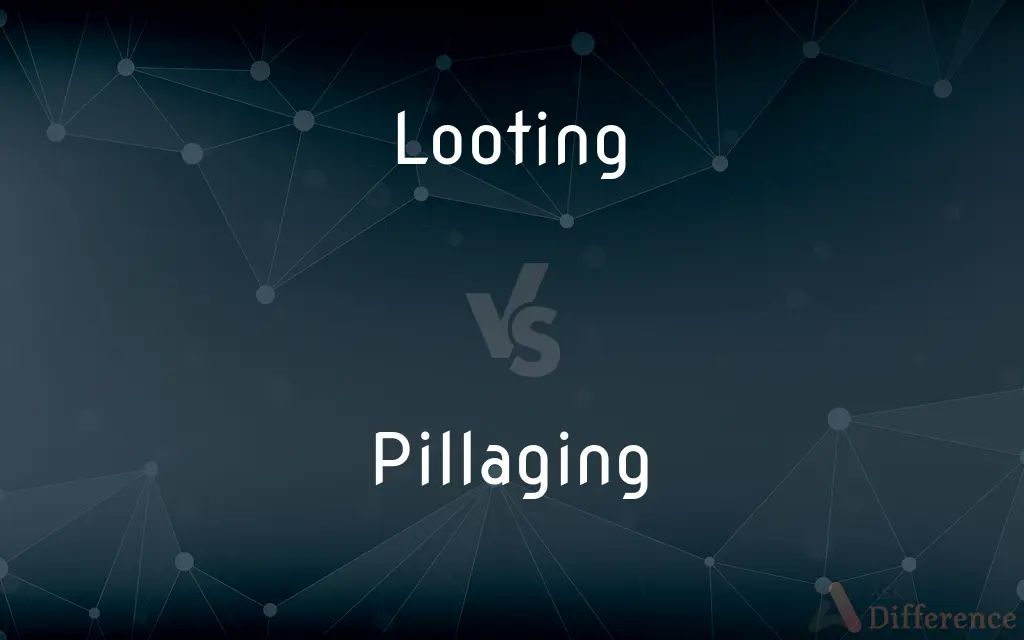Looting vs. Pillaging — What's the Difference?
Edited by Tayyaba Rehman — By Fiza Rafique — Published on October 28, 2023
Looting involves stealing during chaos or disorder, while pillaging is the act of robbing with force, often during wartime.

Difference Between Looting and Pillaging
Table of Contents
ADVERTISEMENT
Key Differences
Looting and pillaging are both acts involving the theft of goods, but they have different contexts and connotations. Looting typically takes place during periods of chaos, disorder, or civil disturbance. Pillaging, however, often conjures images of invaders or conquering armies taking goods by force during times of war or military occupation.
Looting can happen in various situations like riots, natural disasters, or any scenario where law and order break down. The primary motive behind looting is usually opportunistic theft, taking advantage of the lack of authority or control. On the contrary, pillaging is more systematic and organized, historically associated with soldiers or invaders ransacking towns and villages, taking not just valuables but also essential supplies.
Looting does not necessarily involve violence towards individuals, though it can. The act itself is focused on stealing, usually hastily and without planning. Pillaging, meanwhile, often involves a degree of violence against inhabitants or defenders of an area, emphasizing domination and control, and can be an act of war.
Comparison Chart
Definition
Stealing during chaos or disorder
Robbing with force, typically in wartime
Context
Riots, natural disasters, civil unrest
Wars, military occupations, invasions
ADVERTISEMENT
Associated Violence
Not always violent
Typically involves violence against defenders or inhabitants
Planning/Order
Opportunistic, often unplanned
Can be systematic and organized
Modern Usage
Commonly used to describe theft during civil disturbances
More archaic, associated with historic invasions or wars
Compare with Definitions
Looting
Unplanned grabbing of goods during unrest.
The police were called in to control the looting.
Pillaging
Systematic theft during times of domination.
History books detail the pillaging of ancient cities.
Looting
Stealing without regard during chaos.
Protesters condemned the looting of local businesses.
Pillaging
Violent ransacking, especially in wars.
Pillaging was a common strategy to demoralize the enemy.
Looting
Opportunistic theft during civil disturbances.
The aftermath of the hurricane was marred by looting.
Pillaging
Robbing with force, often in a war context.
The invaders were known for pillaging villages.
Looting
Snatching valuables in the absence of law and order.
The collapse of the regime led to looting in the capital.
Pillaging
Plundering goods during military occupation.
The army was ordered to refrain from pillaging.
Looting
Theft during a time of disorder.
The city saw widespread looting after the power outage.
Pillaging
Seizing of assets by an overpowering force.
The kingdom expanded its wealth by pillaging conquered territories.
Looting
Valuables pillaged in time of war; spoils.
Pillaging
To rob of goods by force, especially in time of war; plunder.
Looting
Stolen goods or money.
Pillaging
To take as spoils.
Looting
(Informal) Things of value, such as gifts, received.
Pillaging
To take spoils by force.
Looting
(Slang) Money.
Pillaging
The act of pillaging.
Looting
To take goods from (a place) by force or without right, especially in time of war or lawlessness; plunder
The rebels looted the city. Rioters looted the downtown stores.
Pillaging
Something pillaged; spoils.
Looting
To take by force or without right; steal
Broke into the tomb and looted the grave goods.
Pillaging
Present participle of pillage
Looting
To take goods by force or through lawless behavior.
Pillaging
The act of stealing valuable things from a place;
The plundering of the Parthenon
His plundering of the great authors
Looting
The act of stealing during a general disturbance.
During the looting, the mob stole everything they could and then set fire to the buildings.
Looting
Present participle of loot
While looting the stores the looters took the opportunity for revenge by destroying what they didn't steal.
Looting
Plundering during riots or in wartime
Common Curiosities
Can looting occur after natural disasters?
Yes, looting can occur in the aftermath of natural disasters when there's a breakdown of law and order.
Is pillaging a planned act?
Pillaging can be systematic and organized, especially when conducted by invading or occupying forces.
Is violence inherent in the act of looting?
Looting doesn't necessarily involve violence, but it can. It primarily focuses on theft during disorder.
Is pillaging always an act of war?
Historically, pillaging is often tied to wars or military occupations, but it fundamentally means robbing with force.
Which term is more archaic: looting or pillaging?
"Pillaging" is more archaic, often linked to historical contexts like medieval wars or ancient invasions.
What is looting associated with?
Looting is commonly associated with theft during periods of chaos, disorder, or civil disturbance.
What's the main motive behind looting?
Looting typically stems from opportunistic theft during a lack of authority or control.
Are there modern instances of pillaging?
While the term is archaic, acts that resemble pillaging can still occur, especially in conflict zones.
Why is looting criticized during civil protests?
Looting can overshadow the message of protests, lead to damage, and invite stronger policing or military responses.
Does pillaging involve taking essentials like food and water?
Yes, pillaging can involve taking essential supplies, not just valuables.
Can both terms be used interchangeably?
While they both involve theft, their contexts differ. Using them interchangeably may not always capture the nuances.
Can businesses be accused of metaphorical "pillaging"?
In metaphorical contexts, businesses exploiting resources without regard for local communities might be accused of "pillaging."
Is there a legal consequence for looting or pillaging during wartime?
Yes, international laws, such as the Geneva Conventions, have provisions against pillaging in wartime.
Can looting be organized?
While looting is often opportunistic and unplanned, there can be instances where groups organize to loot.
Why is pillaging considered a war strategy?
Pillaging can demoralize the enemy, weaken resistance, and provide resources to the pillaging force.
Share Your Discovery

Previous Comparison
Slavic Face vs. Germanic Face
Next Comparison
Insulator vs. ResistorAuthor Spotlight
Written by
Fiza RafiqueFiza Rafique is a skilled content writer at AskDifference.com, where she meticulously refines and enhances written pieces. Drawing from her vast editorial expertise, Fiza ensures clarity, accuracy, and precision in every article. Passionate about language, she continually seeks to elevate the quality of content for readers worldwide.
Edited by
Tayyaba RehmanTayyaba Rehman is a distinguished writer, currently serving as a primary contributor to askdifference.com. As a researcher in semantics and etymology, Tayyaba's passion for the complexity of languages and their distinctions has found a perfect home on the platform. Tayyaba delves into the intricacies of language, distinguishing between commonly confused words and phrases, thereby providing clarity for readers worldwide.













































